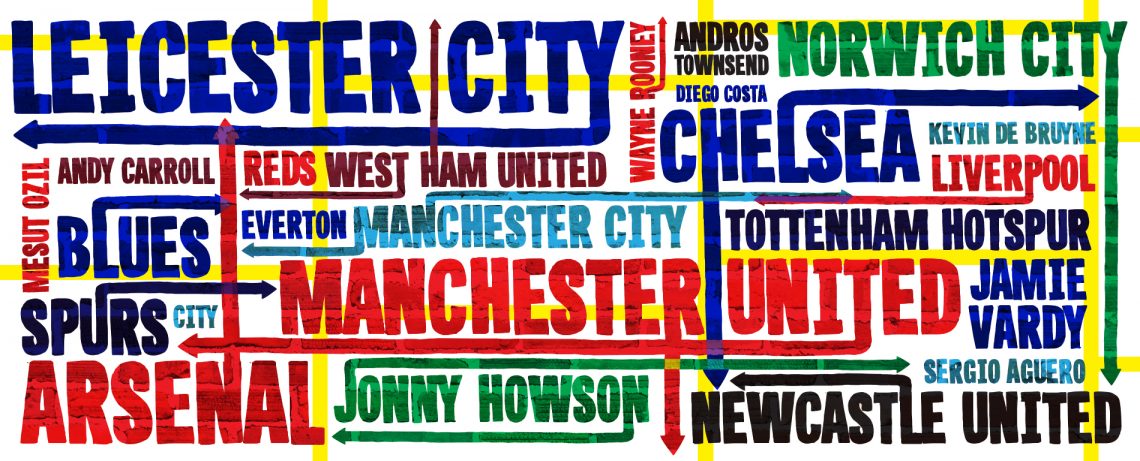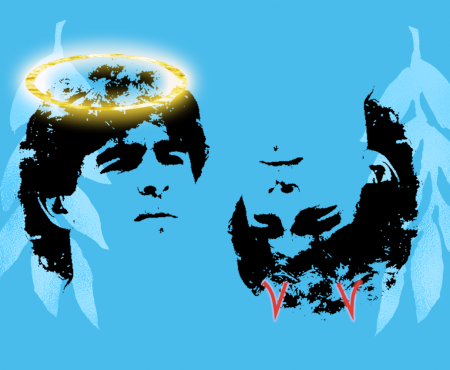Relegation. It’s a word that strikes fear in the hearts of most soccer fans throughout the world. Relegation means your club’s finances will be strained for at least a year. It means that the hot, young striker from a foreign land won’t be wearing your team’s colors next year. It means your favorite players will probably all be sold. Your club’s youth system will be put to the test as management tries to make do on a smaller budget. A thinner roster means a few key injuries could prevent a promotion the following year. Soon it looks like your team might never make its way back to the top.
But for you, the fan, what exactly does relegation mean for you, the fan? An academic study published in The Journal of Sport Management by Joerg Koenigstorfer, Andrea Groeppel-Klein, and Marco Schmitt of Saarland University reports that “English fans of a Premier League club that was relegated to the second division report psychological distress that can be compared with traumatic distress caused by physical threats or natural disasters.”
Relegation means you’ll be spending time and possibly more money finding the more obscure television stations that broadcast the lower leagues. It quickly dons on you that the only chance you’ll have see your team challenge the best the next season is during cup competitions. Maybe you lose interest altogether. Maybe you commit the cardinal sin of football fandom: you find a new side to cheer on.
As an American, the idea of fan fluidity in soccer is not a foreign concept to me. I’ve watched my own fandom within the Barclays Premier League fluctuate over time. I wasn’t born in England and have never traveled there, so my connections with clubs are tenuous at best. It’s not just me, however – I’ve noticed several patterns emerge within American soccer fandom. Most fans have hopped on the bandwagon of one of the Big Four of English football: Manchester United, Chelsea, Manchester City, or Arsenal. These are the frontrunners of the league over the last decade when soccer fandom has really exploded across the pond. Liverpool, Everton and Tottenham Hotspur also enjoy large followings stateside.
I often wonder how many foreign fans choose a club based on playing the EA Sports FIFA series of games – can winning the Champions League on FIFA really create a loyal fan? And could the large American following for Tottenham come down to their unique club crest in FIFA’s team select mode? That might explain the initial appeal of Arsenal, their crest literally a cannon and their nickname the Gunners – it doesn’t get much more red-blooded American than that. Unsurprisingly, according to a Twitter study released last year, Arsenal are the most popular Premier League club in the US by a healthy distance. Arsenal fits another fan factor for Americans: we love an underdog, but also crave rooting for a winner. Arsenal satisfies both desires. Vive la Xbox.
A recent study of American sports fandom found that while soccer fans in the US were the smallest in size according to sheer numbers, they were the most avid. However, Major League Soccer, the North American league, was not enjoying the lion’s share of the fandom. There are two factors at play here: television and the internet.
In the United States, club popularity and the availability (and promotion) of clubs’ TV broadcasts are inherently linked. It’s the TV broadcasts that build the passion nowadays, and they are the building block which allows the matchday to turn into a social event. It used to be that you’d have to be in a club’s hometown to be amongst like-minded fans. Walking through a large city on a Saturday morning now, you’ll find not only soccer pubs, but also club-specific gatherings. I used to get Facebook invites to events at the Everton bar in Boston (The Banshee in Dorchester, in case you were wondering). It’s the television that brings people together.
If television makes the passion possible, it’s the internet that brings it to a boil. Between Twitter and fan blogs, supporters not only have instant access to club news and content, they can even create their own. Finding where, when and with whom to watch the game has never been easier. When your team is on national basic cable every weekend, it’s all too easy to build an entire social calendar around the matches (even for sleep-deprived supporters on the west coast, who often arrange for delayed showings of games at a sympathetic bar). Relegation threatens to break up the party. If your club is relegated, will your friends still turn up at the pub for kickoff? Would the pub even bother trying to find the broadcast for you?
Often it’s television that dictates an (overseas) fan’s commitment to their club. How easy it is to find the match on TV will determine whether or not a fan will pay attention, week in, week out. Premium station beIN Sport is great for Barcelona fans and fans of whichever team happens to be playing Barça that weekend. They’ll even pre-empt Serie A broadcasts to show Real Madrid promo spots. Fox shows every Bayern game, yet it’s very difficult to find the rest of the Bundesliga anywhere on the dial. Television broadcasts the big clubs most often because the big clubs are most popular, yet the big clubs stay the most popular because they’re on television the most.
It’s just so much easier to cheer for a winner. The New York Yankees and Boston Red Sox are the two most popular baseball teams in the US, and it just so happens that the Yankees have won 27 World Series Championships while the Red Sox, after spending almost 100 years as the lovable losers, have enjoyed a lot of recent success – with a corresponding rise in popularity outside the Boston area. In the US, the winners simply require less work to support; in soccer in particular, the big behemoths swallow the best television time slots and appear on the more widely available channels.
And what about fans of teams that aren’t English? It’s hard enough to find Italy’s Serie A on TV (again, we’re back to beIN, but only if Barcelona aren’t on) but what if your club gets sent down? Serie B is literally blacked out in North America, so you’ll be off to one of those less-than-legal streaming sites where the picture quality varies by the second and you may not always understand the language they’re speaking. For these fans, relegation means fandom suddenly feels lonely; social media is now likely the only means of interaction. Not every personality can handle it, but some do take the “till I die” attitude quite seriously – they’ll need to be getting used to scrounging around the bottom of the barrel internet for grainy feeds on weekend mornings.
Despite Chelsea’s struggles this season, we are yet to see what happens to American fan interest should one of the big clubs ever face relegation, but it may look something like the time when my own club, Fulham, was demoted in 2014 (although on a larger scale). While difficult to quantify, American interest in Fulham’s fortunes have shrunk immensely stateside since dropping to the English Championship, despite featuring another young American, Emerson Hyndman, in their matchday lineup. I’d have to imagine Fulham shirt sales have dropped as well, which would be tough luck for their kit manufacturer Adidas while kit sponsor, “Visit Florida,” may not be pulling in the tourists as previously hoped.
Fulham enjoyed a full season on regular cable on NBC Sports Network before literally getting sent to the TV second division. They’re now featured through a patchwork of broadcasts between the various Fox Sports channels and that pesky beIN again. Now just finding the match takes quite a lot of brainpower, especially early on a Saturday. We’ll see how the stateside Aston Villa fans handle it this coming year.
My question for fans of recently relegated teams would be this: Is it different rooting for a new club or weird not even having a club to sing about in the top flight? Is your interest in, for example, the Premier League as a whole declining because your team is no longer involved? So much of the media hype revolves around whatever carefully constructed “narrative” is featured each week; when Fulham were relegated, I just couldn’t bother keeping up anymore. Men in Blazers became even less funny without my team in the mix, a development I’d previously believed impossible.
But foreigners at least have the luxury of choice in our footballing allegiances. Most of us don’t come from a family featuring five generations of Manchester United or Liverpool fans. Despite singing “You’ll Never Walk Alone” every Saturday morning in a Brooklyn or Seoul bar, they don’t actually have to be Liverpool till they die. They live an ocean away. Should Liverpool ever get relegated, I’d be willing to place a wager that most non-UK fans would shift to a new side, at least until Liverpool made their return to the top league once again. Perhaps Villa fans could take a look at Leicester City – I hear the Foxes are pretty good these days? Speaking of LCFC, I wonder how many newly minted soccer fans have chosen them as their preferred club after this season?
We can invest our time, money and efforts into fandom, but the connection is purely emotional; no contracts have been signed. So when faced with your club’s relegation, it’s your choice how to proceed. Your fandom is a precious gift, and you may give it as you wish. Your fellow supporters may give you the side eye if you show up for the next big soccer event in an Arsenal shirt (it’s the cannon thing, isn’t it?), but feel free to stick your tongue out in response. Being a fan of soccer played in a foreign land means it’s okay to shift allegiances. Despite how some supporters feel, your fandom isn’t a marriage. Divorce is as simple as ordering a new jersey from the Team Shop.
And if you can’t give up on your boys, you’ll have to come to terms with the fact that the experience is about to be much different. But in soccer fandom, polyamory is permitted, so if you want to sniff around for another horse to add to your stable, go right ahead. The drop-down menu on FIFA is waiting.









One thought on “That club you follow in a faraway land just got relegated. Now what?”
August 23, 2014. I was flipping channels and encountered an EPL match. Chelsea vs some team I’d never heard of – Lester? No matter. The not Chelsea team, being not Chelsea, had my support for at least 90 minutes. I was a neutral at the time, but looking – flirting with Everton (but they just seemed… Dull) and the Spurs (they seemed… Meh) and even the noisy neighbors (I was young and naïve) – but as the match progressed, and the story of the club was told, and the story of Vardy was told…
Well, I was LTID by the end of regulation.
Sure, they lost 2-0, but they played like they belonged. They played with cero miedo. They played like a team with nothing to lose. They *played*. I was hooked.
And then they tied the Gunners! And beat Stoke and United! I was clearly their good luck charm!!
And then they lost and lost and lost.
I thought about relegation a lot during those days. Actual soul searching, trying to be realistic and find a way forward. In the end, my decision was that I’d always be ‘for’ LCFC, never against, but that I’d be more about following Vardy, or Cambiasso, or Drinkwater, or Ulloa. And maybe some other team could capture my attention, and that’d be fine. But LCFC would be the first, and hopefully people wouldn’t look at me like I look at Sheffield Wednesday supporters (those poor buggers) when I said that.
Until April 2015! Then I was quite proud!!
(Well, actually, it was not until the escape was complete was I actually happily looking forward to mid table mediocrity in 2015-16.)
And then that summer there was the racist sex orgy and the departure of Nigel and here comes the Tinkerman things looked awfully bleak.
So again, as the season started, I started thinking about relegation again. And had the same conclusion as before. LTID? Of course! But I can’t get Championship football in my situation. So maybe there’d be some other side to pull for.
It’s a hard thing; but as a Yank I have to take it as it comes. I’ll be attending my first LCFC match this summer (ICC, vs PSG) and look forward to seeing the practice squad. Good on me! But really I could have just as well been a Villan – my former employer is their premier sponsor, after all – and then where would I be? Maybe on the LCFC bandwagon. Maybe supporting Barça. Or River. Or Galaxy.
But certainly not Chelsea.
Never Chelsea.